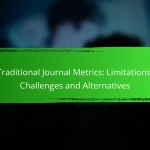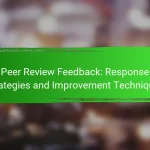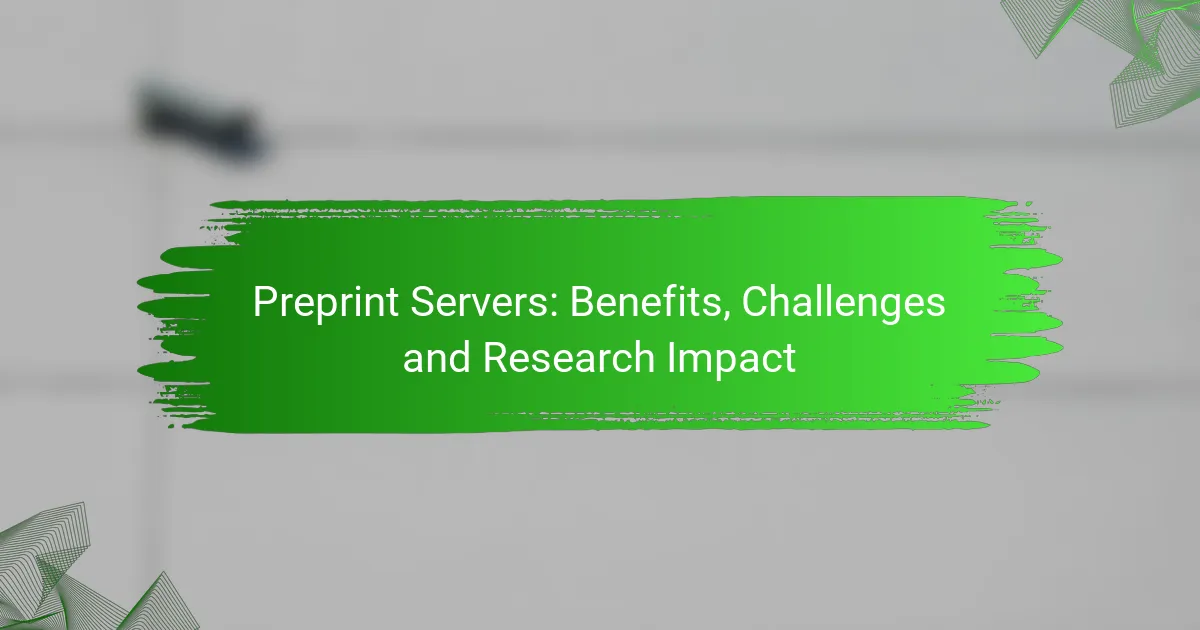Emerging technologies such as AI, blockchain, and open access are revolutionizing industries and reshaping the landscape of knowledge and innovation. AI enhances operational efficiency and decision-making across sectors like healthcare and finance, while blockchain provides secure and transparent solutions through decentralized ledgers. Meanwhile, open access promotes equitable access to research, allowing wider engagement with scientific advancements and fostering collaboration across disciplines.

How is AI transforming industries in the UK?
AI is significantly transforming various industries in the UK by enhancing efficiency, improving decision-making, and personalizing customer experiences. From healthcare to finance and retail, AI technologies are reshaping operational processes and service delivery.
Healthcare advancements
In the UK, AI is revolutionizing healthcare by enabling faster diagnosis and personalized treatment plans. Machine learning algorithms analyze medical data to identify patterns, assisting doctors in making informed decisions. For instance, AI tools can process imaging data to detect conditions like cancer at earlier stages, improving patient outcomes.
Additionally, AI-driven chatbots are streamlining patient interactions, providing 24/7 support for appointment scheduling and basic inquiries. This not only enhances patient satisfaction but also reduces the administrative burden on healthcare professionals.
Financial services automation
AI is automating various processes in the UK financial services sector, leading to increased efficiency and reduced operational costs. Algorithms can analyze vast amounts of data to detect fraudulent activities in real-time, safeguarding both institutions and customers. This proactive approach is crucial in maintaining trust and security in financial transactions.
Moreover, AI-powered robo-advisors are transforming investment management by offering personalized financial advice based on individual risk profiles and market conditions. This democratizes access to financial planning, allowing more people to benefit from investment opportunities.
Retail customer experience enhancement
In retail, AI is enhancing customer experiences through personalized recommendations and efficient inventory management. By analyzing purchasing behavior and preferences, retailers can tailor marketing strategies and product offerings to meet customer needs. This targeted approach often results in higher conversion rates and customer loyalty.
Furthermore, AI technologies facilitate dynamic pricing strategies, allowing retailers to adjust prices based on demand fluctuations and competitor actions. This adaptability helps businesses maximize profits while remaining competitive in the market.

What are the benefits of Blockchain technology?
Blockchain technology offers numerous advantages, including enhanced security, improved transparency, and increased efficiency in various applications. By utilizing a decentralized ledger, it minimizes the risks associated with data tampering and fraud.
Enhanced security measures
One of the primary benefits of blockchain technology is its enhanced security. Each transaction is encrypted and linked to the previous one, creating a secure chain that is difficult to alter. This structure makes blockchain particularly appealing for industries that require high levels of data integrity, such as finance and healthcare.
Additionally, the decentralized nature of blockchain means that there is no single point of failure. This reduces the risk of hacking and unauthorized access, as attackers would need to compromise multiple nodes simultaneously. Organizations can implement blockchain solutions to safeguard sensitive information and maintain trust with their users.
Improved transparency in transactions
Blockchain technology significantly improves transparency in transactions by providing a public ledger that is accessible to all participants. This visibility allows stakeholders to verify transactions independently, fostering trust among users. For example, in supply chain management, each step of a product’s journey can be recorded on the blockchain, enabling consumers to trace the origin and authenticity of goods.
Moreover, the immutability of blockchain records ensures that once a transaction is recorded, it cannot be changed or deleted. This feature is particularly beneficial for regulatory compliance, as it creates an auditable trail of all transactions. Businesses can leverage this transparency to enhance their accountability and build stronger relationships with customers and partners.
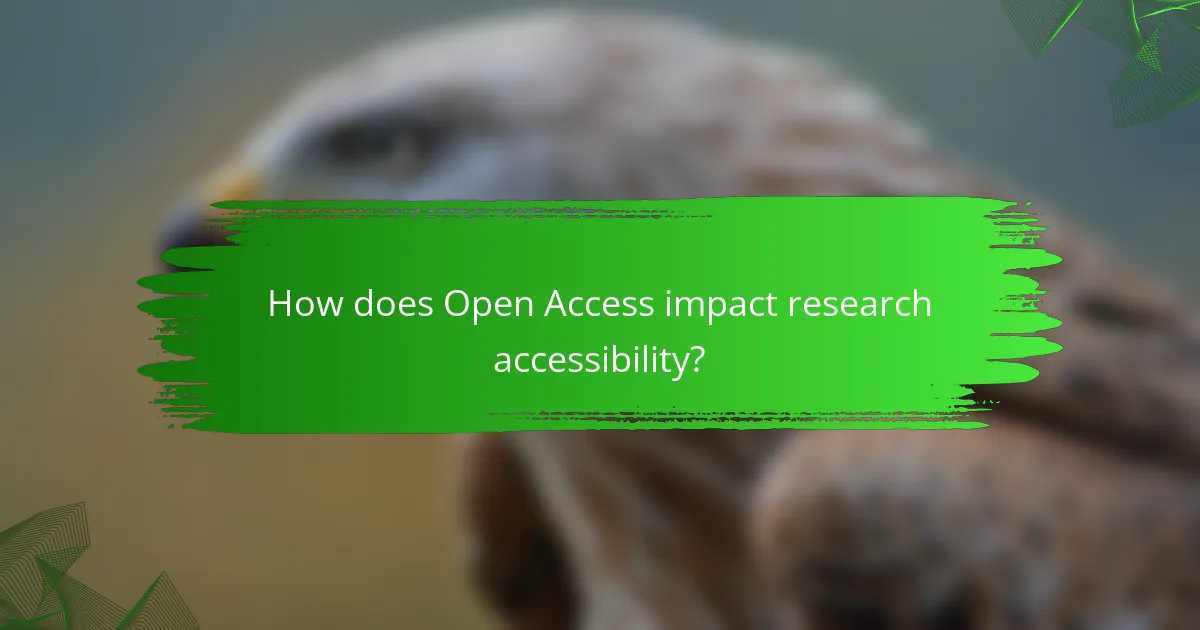
How does Open Access impact research accessibility?
Open Access significantly enhances research accessibility by allowing anyone to read and use scholarly articles without financial barriers. This model democratizes knowledge, enabling broader engagement with scientific findings across various sectors.
Increased public access to scientific papers
Open Access removes subscription fees, making scientific papers freely available to the public. This shift allows individuals, including students, educators, and professionals, to access valuable research without institutional affiliations or high costs.
For example, platforms like PubMed Central and arXiv host a vast array of articles that anyone can read. This increased availability can lead to a more informed public and greater interest in scientific topics.
Boosted collaboration among researchers
Open Access fosters collaboration by making research findings readily available to scholars worldwide. When researchers can easily access each other’s work, they are more likely to build on existing studies and share insights, leading to innovative solutions.
Collaborative projects often emerge from shared research, as seen in fields like medicine and environmental science. Researchers can connect through platforms that facilitate discussions and partnerships, enhancing the overall impact of their work.
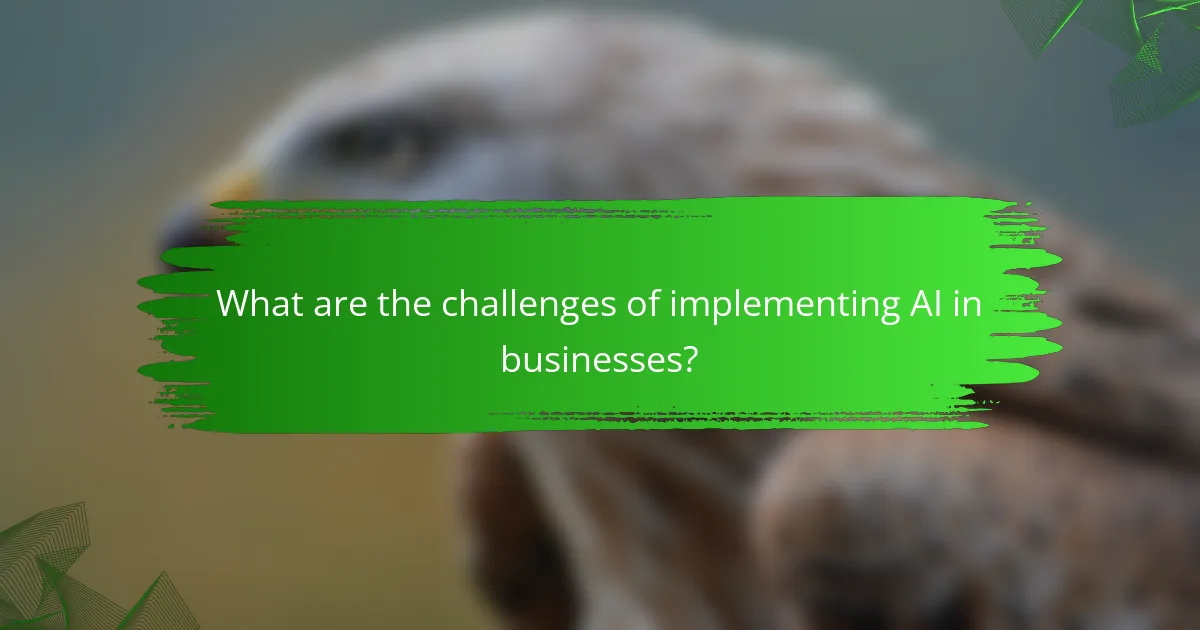
What are the challenges of implementing AI in businesses?
Implementing AI in businesses presents several challenges, including data privacy concerns and high implementation costs. Addressing these issues is crucial for successful integration and maximizing the benefits of AI technologies.
Data privacy concerns
Data privacy is a significant challenge when integrating AI systems, as these technologies often require access to sensitive information. Businesses must ensure compliance with regulations such as the GDPR in Europe or CCPA in California, which mandate strict guidelines on data collection and usage.
To mitigate privacy risks, companies should adopt robust data governance frameworks and implement encryption and anonymization techniques. Regular audits and employee training on data handling can further enhance privacy protection.
High implementation costs
The costs associated with implementing AI can be substantial, often involving investments in technology, infrastructure, and skilled personnel. Initial expenses may range from thousands to millions of dollars, depending on the complexity and scale of the AI solution.
To manage these costs, businesses can start with pilot projects that focus on specific use cases, allowing for gradual scaling and evaluation of ROI. Additionally, exploring partnerships with AI vendors or utilizing cloud-based AI services can help reduce upfront investments.

What are the key considerations for adopting Blockchain?
When adopting blockchain technology, organizations must focus on regulatory compliance, scalability issues, and integration with existing systems. These considerations are crucial for successful implementation and long-term viability.
Regulatory compliance
Regulatory compliance is essential when implementing blockchain solutions, as different jurisdictions have varying laws governing data privacy, financial transactions, and digital assets. Organizations should familiarize themselves with local regulations, such as the General Data Protection Regulation (GDPR) in Europe or the Financial Action Task Force (FATF) guidelines globally.
Failure to comply can lead to significant penalties and legal challenges. It is advisable to consult with legal experts to ensure that the blockchain application adheres to all relevant laws and industry standards.
Scalability issues
Scalability is a critical challenge for blockchain technology, as many networks struggle to handle a high volume of transactions efficiently. For instance, public blockchains may experience delays and increased costs during peak usage times, which can hinder user experience.
To address scalability, organizations can explore solutions such as layer-2 protocols or private blockchains, which can offer faster transaction speeds and lower costs. It is essential to evaluate the specific needs of the application and choose a blockchain solution that balances scalability with security and decentralization.

How does Open Access affect academic publishing?
Open Access (OA) significantly transforms academic publishing by making research freely available to the public, which enhances visibility and accessibility. This shift challenges traditional publishing models and encourages new funding mechanisms, impacting how research is disseminated and consumed.
Shift in funding models
The rise of Open Access has led to a rethinking of funding models in academic publishing. Traditionally, subscription fees supported journal operations, but OA often relies on article processing charges (APCs) paid by authors or their institutions. This can create financial pressure, especially for researchers with limited funding.
Institutions and funding bodies are increasingly adopting policies that support OA, which can include covering APCs or providing grants specifically for this purpose. Researchers should be aware of these options and consider them when planning their publications.
Impact on journal subscriptions
Open Access has a profound effect on journal subscriptions, as many institutions are reevaluating their subscriptions in favor of OA alternatives. This trend can lead to decreased revenue for traditional publishers, prompting them to adapt their business models. Some journals may offer hybrid models, combining subscription access with OA articles.
Researchers should assess the value of subscription-based journals versus OA options. While OA can increase readership and citations, it is essential to consider the reputation and impact factor of the journals in which they publish. Balancing these factors is crucial for effective academic communication.

What are the future trends in AI technology?
The future trends in AI technology focus on enhanced capabilities, increased integration with other technologies, and ethical considerations. As AI continues to evolve, its applications will expand across various sectors, driving innovation and efficiency.
Increased integration with IoT
AI’s integration with the Internet of Things (IoT) is set to transform how devices communicate and operate. By leveraging AI algorithms, IoT devices can analyze data in real-time, leading to smarter decision-making and automation.
This integration allows for predictive maintenance in industries such as manufacturing and transportation, where AI can forecast equipment failures before they occur. For example, smart sensors can monitor machinery performance and alert operators when maintenance is needed, reducing downtime and costs.
When implementing AI with IoT, consider data privacy and security. Ensure that devices are equipped with robust encryption and adhere to relevant regulations to protect sensitive information. Regularly update software to mitigate vulnerabilities and enhance system resilience.

